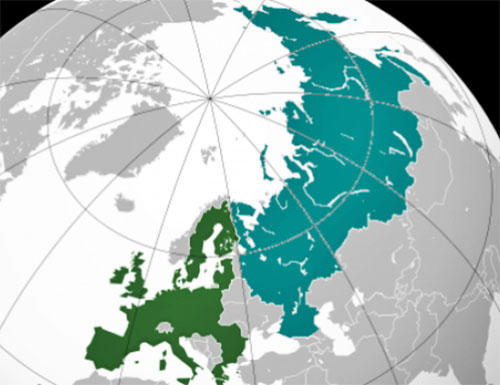|

by Fort Russ
October 20, 2016
translated from Russian by
Kristina Kharlova
from
FortRuss Website
Original version in Russian

Washington researchers
accuse Russia of cooperation
with Europe.
Europe is dependent on
financial and energy resources
of Moscow,
according to a report by
the Washington Center for
strategic
and international studies.
On October 13 in Washington, a study was published, "The
Kremlin's Playbook - Understanding the Russian Influence in Eastern
and Central Europe", which on the example of five
countries:
-
Latvia
-
Hungary
-
Bulgaria
-
Slovakia
-
Serbia,
...explains the mechanisms of the
workings of the Kremlin with the economies of European states.
The study notes that when the countries of Eastern and Central
Europe joined NATO and the EU in 2004, the expectations of European
and American politicians were aimed at the,
"continuation by regional states of
positive democratic and economic transformation".
However, analysts believe that more than
ten years later,
"the region has experienced a steady
decline in democratic standards, while its economic cooperation
with Russia has expanded significantly".
"Over the last 10 years the share of Russia in the global
trading system increased by almost four times: from $210 billion
in 2003 to $730 billion in 2014, and Russia's trade relations
with the European Union accounted for 44% of the total," - said
the preamble of the report.

According to analysts,
the work of Russia in Latvia, Hungary, Bulgaria, Slovakia
and Serbia, is aimed at consolidating around itself the sympathetic
politicians, dominance on energy markets and providing the most
favorable economic partnerships. [How dare you Putin...? - FR]
"In some countries, Russian
influence has reached such proportions that it jeopardized their
pro-Western orientation and Euro-Atlantic stability, as such,"
reads the report.
According to the study, Latvia has a
high dependence on the Russian economy (higher only in Bulgaria).
"Latvia is 100% dependent on the
energy sector of the Russian Federation, which, moreover, is the
third largest market of the republic, and 11% of Latvian GDP
comes from the transport sector, where the main flow of transit
is provided by Russia", analysts say.
The report states that entrepreneurs are
dependent on the Russian economy and the normal functioning of
relations with Russia.
Measures to prevent Russian influence
proposed by the researchers, are analysis of financial flows coming
from Russia and improvement of assistance programs to Eastern
European governments. [More American/European tax-payer
handouts...! - FR]
"The United States can no longer be
indifferent to these negative processes.
All members of NATO and the European
Union must collectively recognize that Russia's influence is not
only internal challenge to control, but a threat to national
security," point U.S. analysts.
The report was prepared by the Center
for Strategic and international Studies (CSIS)
in collaboration with the Center for the Study of Democracy in
Sofia.
CSIS was created in Washington in 1962
at the initiative of the director of the CIA with the aim of,
"finding ways to sustain American
prominence and prosperity as a force for peace".
Today, CSIS conducts research on policy
issues and strategic analysis of political and economic challenges,
with a particular focus on issues concerning international
relations, trade, technology, finance and energy.
|



